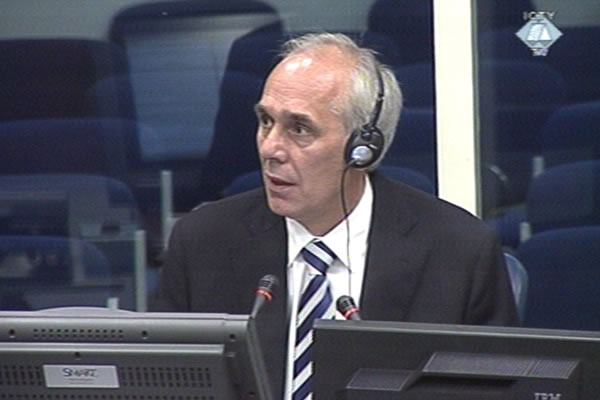Home
ROLE OF ‘FRUIT PICKERS’ IN SREBRENICA MASSACRE
In his evidence in Radovan Karadzic’s defense, Ljubomir Borovcanin, who has been convicted by the Tribunal, tried to shift the blame for the massacre of more than 1,000 captives in Kravica on the ‘full-time staff’ of the farm where the crime happened. As the prosecutor put it, Borovcanin blamed the local ‘fruit pickers and farmers’. Borovcanin conceded that he was responsible for the crimes, but he did not go all the way to say he was indeed guilty. In his evidence, he strove to exonerate Karadzic any which way he could
 Ljubomir Borovcanin, defence witness of Radovan Karadzic
Ljubomir Borovcanin, defence witness of Radovan Karadzic Since he didn’t appeal against the judgment sentencing him to 17 years for the crimes in Srebrenica and Zepa, the commander of the police in the Srebrenica operation, Ljubomir Borovcanin had his work cut out for him trying to defend Radovan Karadzic. On the one hand, Borovcanin could not challenge the findings in his judgment on the events in July 1995, and on the other, he had to deny the responsibility of the Republika Srpska president and the supreme commander of the army that had conducted the operation.
Karadzic read out the summary of Borovcanin’s statement to the defense. On 13 July 1995, Borovcanin passed by the farm warehouse in Kravica and he saw the bodies of 20 to 30 dead Muslims. Borovcanin claimed that he was told that it had been ‘an incident’: a prisoner tried to seize a Serb policeman’s rifle. In his statement, Borovcanin also said he knew that detainees had been brought to Bratunac from other locations. However, ‘nothing indicated’ they would be killed, Borovcanin noted, adding that he wasn’t aware that the residents of Srebrenica had been killed in the Zvornik area. Based on ‘everything I knew about the opinions and character of Radovan Karadzic’, it would be ‘extremely difficult to believe’ that he allowed the murder of Srebrenica men and boys.
When the accused completed his examination, the prosecutor cross-examined the witness. Borovcanin and McCloskey are old acquaintances from Borovcanin’s trial. ‘How many murders did you participate in?’, prosecutor McCloskey asked the witness, going for the jugular. The witness replied that the best answer was to be found in his judgment; the judges found that men under his control took part in the execution of detainees in the Kravica farm warehouse. Asked if he was willing to accept his part of the responsibility for the crimes against the Srebrenica citizens, Borovcanin said, ‘I accept the findings in the judgment’, but he insisted that he was ‘not competent’ to comment on legal issues.
Borovcanin didn’t deny that police officers subordinated to him secured the warehouse but said it was not ‘under my sole jurisdiction’. There were ‘full-time staff’ from the farm who were there as part of their compulsory work service. The prosecutor was perplexed and asked him if he blamed ‘the farmers and fruit pickers’ for the crimes against the captives. Borovcanin replied that he didn’t blame anyone. The only thing that he wanted to highlight is that ‘all aspects should be taken into consideration’ and that the ‘staff’ at the Kravica farm were armed.
On 13 July 1995 in Srebrenica, Zoran Petrovic Pirocanac, a journalist from Belgrade, joined Borovcanin. The two toured the newly captured territory. Pirocanac diligently recorded everything on his camera, what later helped the OTP’s investigation. The footage, broadcast in the days that followed by the Belgrade TV network Studio B, showed a pile of bodies in front of the warehouse in Kravica. Since Borovcanin was in the car with Pirocanac, the prosecutor asked him what he did to help those men. ‘Obviously, they were beyond help’, replied the witness. The prosecutor noted that some of them did survive but that some of those inside the warehouse, who were still awaiting the execution, would have been glad to receive some help. ‘It is widely known that I failed to do enough to help them’, Borovcanin responded; he thought that the detainees in Kravica ‘weren’t under his jurisdiction’.
In a bid to protect Karadzic, the witness said in his statement that he had never discussed the events with him. That prompted the prosecutor to remind the witness of his interview with the OTP investigators in 2002; Borovcanin told them that in the evening of 13 July 1995 he was present when Ljubisa Beara, security chief in the VRS Main Staff, and Karadzic’s commissioner for Srebrenica Miroslav Deronjic discussed whether the captured men from Srebrenica should be executed in the Bratunac or Zvornik area. That same night Borovcanin ordered his driver to drive Deronjic to Pale. When prosecutor McCloskey asked if Deronjic went there to meet with Karadzic, the witness replied that he could assume that was the case. However, the witness didn’t want to answer the prosecutor when he asked him whether Deronjic, as an ‘intelligent man’, ‘a loyal SDS member’ and Karadzic’s commissioner had conveyed to the president ‘all the important information’, which would include the information concerning the execution of thousands of men and boys from Srebrenica.
Since the prosecution has completed its examination, tomorrow the accused will re-examine the witness.Linked Reports
- Case : Karadzic
- 2013-06-05 KARADZIC’S BALLISTIC EXPERT COMPLETES EVIDENCE
- 2013-05-31 NENAD KECMANOVIC – ‘PROPAGANDA VICTIM’
- 2013-05-30 KARADZIC’S EXPERT: ENTIRE CITY OF SARAJEVO WAS NOT MILITARY TARGET
- 2013-06-07 EXECUTIONS ‘IN WAVES’
- 2013-06-07 SESELJ’S THREATS STILL VALID
- 2013-06-10 FRENCH AND SERB NATIONALISTS DEFEND KARADZIC
